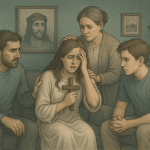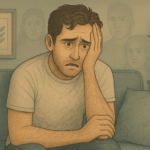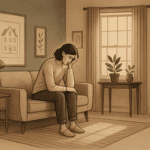Key Takeaways
- Psychosis typically happens in three stages: prodrome, acute, and recovery.
- Genetic, environmental, and stress-related factors can influence the progression of psychosis stages.
- A Mission for Michael (AMFM) provides compassionate, individualized care for adults with psychosis – combining evidence-based and experiential therapies, medication management, and supportive environment for recovery.
Understanding Psychosis
Psychosis affects how the brain processes information, causing a loss of touch with reality. Symptoms like hallucinations, delusions, and disorganized thinking make it hard for individuals to distinguish reality, leading to confusion and distress.

The sooner treatment begins, the better the chances of minimizing the impact of psychosis on one’s life. Early treatment can help prevent further episodes and reduce the severity of symptoms.
That’s why knowing the stages of psychosis and their signs is important.
Founded in 2010, A Mission For Michael (AMFM) offers specialized mental health care across California, Minnesota, and Virginia. Our accredited facilities provide residential and outpatient programs, utilizing evidence-based therapies such as CBT, DBT, and EMDR.
Our dedicated team of licensed professionals ensures every client receives the best care possible, supported by accreditation from The Joint Commission. We are committed to safety and personalized treatment plans.
Initial Psychosis Stage: Prodrome
The first stage of psychosis is prodrome. It’s characterized by subtle changes in thoughts, emotions, and behaviors, lasting weeks to years (but averaging over a year).
- Difficulty concentrating, memory problems, and challenges in processing information
- Sense of confusion or disconnection from reality
- Symptoms such as anxiety, depression, mood swings, and irritability
- Overwhelmed or increased sensitivity to sensory stimuli (e.g., sounds may seem louder).

- A drop in performance at work or school or other responsibilities
- Neglecting personal hygiene and daily routine
- Sudden interest in unusual topics (e.g, religion or conspiracy theories) that seem out of character
- Changes in sleep patterns, such as insomnia or excessive sleeping
- Withdrawal from social activities and relationships
- Decreased performance at school or work
- Difficulty concentrating or remembering things
Second Psychosis Stage: Acute
In the acute stage of psychosis, individuals experience their first full-blown psychotic episode, which lasts less than a month.
Here’s what happens during this acute stage:
- There may be intense episodes of hallucinations (e.g., hearing voices) or delusions (e.g., thinking one has superpowers).
- Individuals may talk to themselves or have unusual postures
- These behaviors can affect employment, relationships, and self-care
- Individuals in acute psychosis often face social stigma
Final Psychosis Stage: Recovery
Recovery from the acute phase usually begins within weeks to months after treatment starts.
Treatment and Support
Antipsychotic medications reduce symptoms like hallucinations and delusions, while Cognitive Behavioral Therapy (CBT) helps replace negative thought patterns with healthier coping strategies.
Family therapy helps loved ones understand the condition and support their family members effectively.
Long-term Management
Long-term management focuses on maintaining stability, preventing relapse, and promoting overall well-being. It requires a comprehensive approach that combines medication, therapy, and lifestyle changes.
- Having regular follow-up appointments with a mental health professional
- Following the prescribed medication regimen
- Attending therapy sessions to address underlying issues
- Practising healthy lifestyle habits – regular exercise, adequate sleep, and a balanced diet
Factors Influencing Psychosis Progression
- Genetic Components: A family history of psychotic disorders increases the risk of developing psychosis, though genetics alone do not determine its development.
- Environmental Triggers: Stress and trauma can trigger or worsen psychosis. Major life events like loss of a loved one may increase the risk of psychotic episodes.
Psychosis Treatment at A Mission for Michael
Dealing with psychosis can feel overwhelming, but help is within reach. At AMFM, we provide treatment programs for individuals experiencing severe mental health crises, including psychosis.
“We see the person behind the diagnosis. Here, you’re not a patient with a condition to cure, you’re a human with a life worth rebuilding.”
Using evidence-based therapies like CBT, and experiential methods like art and music therapy, we help clients manage symptoms while addressing the underlying causes of their condition.

Frequently Asked Questions (FAQ)
What’s the first sign of psychosis?
The first signs of psychosis often appear during the prodrome stage and can include subtle changes in thoughts, emotions, and behaviors. These may include withdrawal from social activities, decreased performance at work or school, and increased sensitivity to sensory input.
Is psychosis the same as schizophrenia?
Psychosis and schizophrenia are related but not the same. Psychosis is a symptom that can occur in various mental health conditions. While schizophrenia is a specific diagnosis characterized by persistent psychotic symptoms.
Can stress cause psychosis?
Stress can be a contributing factor to the onset of psychosis, particularly in high-risk individuals. Stressful life events, such as death of a loved one or loss of job, can trigger or worsen psychotic symptoms.
What is A Mission for Michael?
At AMFM, we help adults with psychosis through customized treatment plans that combine evidence-based therapies and experiential approaches – all delivered in a home-like peaceful environment.













